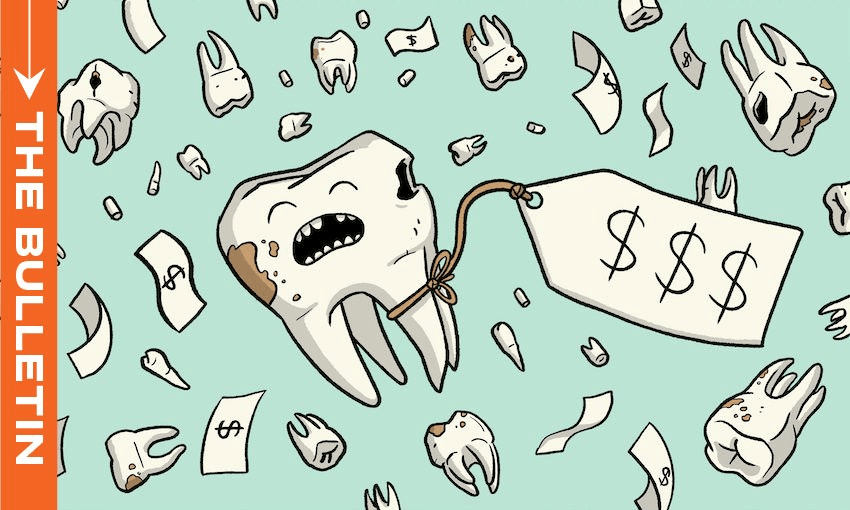It’s hard not to smile about free dental care, but dentists say there could be holes in the costings. Meanwhile, China is watching as more questions surface about National’s foreign buyer tax, writes Anna Rawhiti-Connell in this excerpt from The Bulletin, The Spinoff’s morning news round-up. To receive The Bulletin in full each weekday, sign up here.
The high cost of bad teeth
If today’s feature image looks familiar to Side Eye fans, it’s because it’s from Toby Morris’ March 2020 edition investigating the high cost of bad teeth. There wouldn’t be many people who’d argue against improving access to dental care. The insistence on treating teeth as decorative face jewels, rather than a fairly important part of the body has long been a healthcare anomaly. North and South counted the reasons why in 2021. Despite that, it’s been considered too expensive to offer universally. Dame Jacinda Ardern said as much as recently as January this year. The Green party has a universal free dental care policy, which would be paid for by making changes to the tax system. The party estimated the policy would cost $1.41b in the first year, rising to $1.71b in the 2025 and 2026.
Costings too low?
Labour isn’t offering free dental care for all yet, instead announcing free dental care for all under 30s by 2026 at its campaign launch on Saturday. The Dental Association has raised issues with Labour’s costings, saying the budgeted $380m is too low and dentists would be stretched to roll it out. Hipkins says he’s comfortable with the policy’s costings, which are based on costings associated with the current funding of dental care for those aged 13-18 and adjusted for inflation. Dr Robin Whyman at the Dental Association says “Providing dental care to young adults is a different level of service than providing to the young teenage years and that will be part of the challenge of rolling the plan out dental care needs for those over 18.” The “Tooth be told” report last year from the Association of Salaried Medical Specialists said that cost benefit analysis showed that every dollar invested in dental care would return $1.60 to the country.
Staffing the plan relies on immigration green list
Labour’s plans include increasing the dental workforce by increasing the number of places in the Bachelor of Dental Surgery course by 50%. As Anna Whyte reports for The Post this morning, the University of Otago’s dean of dentistry, Paul Cooper said the staged increase over two years to 90 students was “an achievable and sensible model of implementation’ and “would be a significant investment in the country’s dental health workforce.” Newsroom’s Jo Moir notes that the additional trainees won’t start study until March 2025 and won’t be qualified until at least 2030. Health minister Ayesha Verrall told Newsroom the fast-track green list for immigration will need to be relied on and as many as 200 dentists recruited from abroad. Dentists were added to the green list in April this year.
Does anyone care what election promises cost?
As of yesterday, National’s tax policy was still under scrutiny with specific focus on whether the proposed “foreign buyer tax” would breach tax treaties. It now seems mired in the intricacies of tax law. interest.co.nz’s Dan Brunskill has one tax expert saying the party would be able to charge foreign buyers a 15% fee without breaching New Zealand’s free trade agreements — as long as they don’t call it a tax. Newshub reports China is watching, with the Chinese ambassador saying “We are studying the specific details and implications” and “hope the final legislation… is consistent with the agreements signed between China and New Zealand”. With the carrots dangled and a now ubiquitous volley of “costings, costings, costings” in play, BusinessDesk’s Jem Traylen asks whether anyone cares how much election promises really cost (paywalled). NZ Initiative’s Eric Crampton believes “politicians have worked out that New Zealand voters don’t care about the robustness of claims about how much election promises cost and are swayed by other considerations instead.” Max Rashbrooke argues recent examples “illustrated perfectly the need for an independent budget office that could provide a costing service.” An attempt to get an independent budget office up and running which could cost policy was quashed by Simon Bridges in 2019. Play on, I guess.


